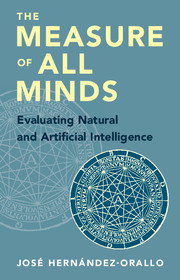Book contents
- Frontmatter
- Contents
- List of Panels
- Preface
- PART I A LONG-PONDERED OUTFIT
- PART II THE EVALUATION DISCORDANCE
- PART III THE ALGORITHMIC CONFLUENCE
- 7 Intelligence and Algorithmic Information Theory
- 8 Cognitive Tasks and Difficulty
- 9 From Tasks to Tests
- 10 The Arrangement of Abilities
- 11 General Intelligence
- PART IV THE SOCIETY OF MINDS
- PART V THE KINGDOM OF ENDS
- References
- Index
- Plate section
10 - The Arrangement of Abilities
from PART III - THE ALGORITHMIC CONFLUENCE
Published online by Cambridge University Press: 19 January 2017
- Frontmatter
- Contents
- List of Panels
- Preface
- PART I A LONG-PONDERED OUTFIT
- PART II THE EVALUATION DISCORDANCE
- PART III THE ALGORITHMIC CONFLUENCE
- 7 Intelligence and Algorithmic Information Theory
- 8 Cognitive Tasks and Difficulty
- 9 From Tasks to Tests
- 10 The Arrangement of Abilities
- 11 General Intelligence
- PART IV THE SOCIETY OF MINDS
- PART V THE KINGDOM OF ENDS
- References
- Index
- Plate section
Summary
No classification of the mental powers has been universally accepted.
– Charles Darwin, The Descent of Man, and Selection in Relation to Sex (1871)IN THE PREVIOUS chapters we have focused on tasks and their difficulty. In a way, difficulty can be seen as the height of a task. Arranging tasks by their difficulty is an insightful way of analysing the proficiency they need and how discriminating they are, in order to choose items, compare subjects and determine aggregate indicators. To complete what could be referred to as a ‘task theory’, we will now deal with the breadth of a task, its pureness and how tasks can be composed and related to each other. From these relations we will investigate the notion of cognitive ability and how these abilities could also be arranged. The approach in this chapter basically replaces empirical correlation between tasks and abilities by a non-empirical notion of similarity, using AIT. This is not done with the description of the task, but again with the description of its acceptable policies, using information distance or the previously introduced notion of difficulty.
FACING THE TASK CONTINUUM
When we are interested in one particular task, we can define a test using that task. This would be perfectly right from the psychometric functionalityoriented point of view (e.g., if the task is required for a job), as we discussed in Chapter 3. This is natural from an evolutionary fitness standpoint (e.g., if the task happens in the species's environment), as we discussed in Chapter 4. Similarly, it would fit well the task-oriented stance in artificial intelligence (e.g., if the task corresponds to a particular application), as we discussed in Chapter 5. In the end, the set of infinitely many possible taskswould lead to infinitely many tests. However, deriving a cognitive profile for each creature in the machine kingdom in these terms would be mostly useless to determine how an agent is going to behave in a different situation. In other words, working at the level of particular tasks has no explanatory power or predictability beyond the tasks for which the agent has been evaluated.
- Type
- Chapter
- Information
- The Measure of All MindsEvaluating Natural and Artificial Intelligence, pp. 259 - 282Publisher: Cambridge University PressPrint publication year: 2017



